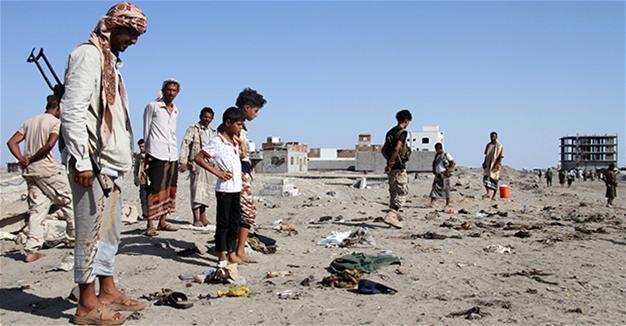At least 40 dead in Yemen suicide blast
ADEN – Agence France-Presse

AFP photo
A suicide bomber killed at least 40 Yemeni soldiers in Aden on Dec. 18, the latest in a string of deadly bomb attacks against recruits in the war-torn country’s second city.
Military officials and medics said many others were wounded in the attack that targeted a crowd of soldiers gathered to collect their salaries near a base in northeastern Aden.
The attacker immersed himself among the soldiers crowding outside the house of the head of special security forces in Aden, Colonel Nasser Sarea, in Al-Arish district, near Al-Sawlaban base.
Sarea said the bomber “took advantage of the gathering and detonated his explosives among them, killing 40 soldiers and wounding several others.”
Images from the blast scene showed blood stains and scattered shoes across the sandy ground.
The attack comes eight days after a similar bombing at Al-Sawlaban claimed by the Islamic State of Iraq and the Levant (ISIL) killed 48 soldiers and wounded 29 others.
Yemeni authorities have for months pressed a campaign against jihadists who remain active in the south and east of the impoverished Arabian peninsula country.
ISIL and its jihadist rival al-Qaeda have taken advantage of a conflict between the government and Yemen’s Huthi rebels, who control the capital Sanaa, to bolster their presence across much of the south.
The two extremist groups have carried out a spate of attacks in Aden, Yemen’s second city and headquarters of the internationally recognized government whose forces retook the port city from the Huthis last year.
But Al-Qaeda has distanced itself from the Dec. 10 attack, claiming that it tends to avoids “the shedding of any Muslim blood” while focusing on fighting the “Americans and their allies.”
No group claimed immediate responsibility for Sunday’s blast.
Al-Qaeda has long been the dominant jihadist force in Yemen, located next to oil-flush Saudi Arabia and key shipping lanes, but experts say ISIL is seeking to supplant its extremist rival.
Washington regards al-Qaeda’s Yemen-based branch as its most dangerous and has kept up a long-running drone war against its commanders.
In August an ISIL militant rammed his explosives-laden car into an army recruiting center in Aden, killing 71 people in the deadliest jihadist attack on the city in over a year.
A Saudi-led coalition has since March 2015 supported loyalist forces fighting the Huthis.
The Arab coalition intervened after Huthi rebels allied with troops loyal to Yemen’s former president Ali Abdullah Saleh seized the capital Sanaa and overran other parts of the country.
But the coalition later turned its firepower also at Sunni jihadists, supporting forces loyal to President Abedrabbo Mansour Hadi in their bid to flush extremists out of south Yemen.
The Yemen war has killed more than 7,000 people, about half of them civilians.
